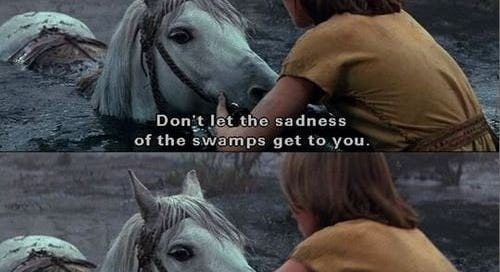Community Tuesdays Chat: Is this even worth doing?
And the question Joseph Goldstein asks himself when he's feeling doubt
Tell me, what else should I have done?
Doesn't everything die at last, and too soon?
Tell me, what is it you plan to do
with your one wild and precious life?
— Mary Oliver
Right now, it seems like everyone has an idea about how to make the world better, and some of those ideas are contradictory.
Creativity is resistance!
Protest is essential!
Creativity and protest are both pointless. What we need is a secret third thing!
As a busy caregiver, I care deeply about the suffering of the world and I also suffer myself from time poverty. So when I set the intention this month in our subscriber chat to bring my mother-self into alignment with my activist self, each time I stepped away from caregiving to call my Congressperson, I thought long and hard about whether the actions I chose made sense, as Joan Halifax would put it. Because, I tell myself, I don’t have time to be nonsensical.
As a meditator, I feel similarly: I want to make the most of my time. Especially since my sessions either take place during the limited hours when I have precious outside childcare, or on my partner’s watch. This fact keeps me honest about actually meditating. I can’t just sit there quietly humming the theme song to Bluey to myself for thirty straight minutes. I have to have some sense of what I am on the cushion to do.
To put it bluntly: busy caregivers don’t have time to fuck around.
It’s good to want to act skillfully and intentionally, of course. But this month, I’ve been experiencing the perfectionistic shadow side of intentionality: overthinking it.
Sometimes I find myself equivocating when it comes to what I should be doing and how I should be doing it, how best to spend my precious time and energy, in ways that ironically also waste time and energy. In this state, I often accomplish nothing at all.
In Buddhist meditation terms, this kind of internal back-and-forth could be categorized as a form of vicikicchā, or doubt. Doubt is considered one of the Five Hindrances1 — five common bugaboos, which range from getting too sleepy to getting too distracted by worries, that can mess with your intentions to meditate. The big Five are typically presented as common, ho-hum obstacles that everyone faces, nothing special, which is good for us perfectionists to remember.
Of these, however, doubt is considered the worst, because doubt is the only thing that can convince you not to keep going. To give up. To not even try.
This is something we don’t talk enough in caregiver-world — the fact that sometimes we don’t pursue our intentions because we’re second-guessing whether we’ve chosen the right ones.
This is especially true right now. The word “unprecedented” appears in our news feeds every single day. It’s easy to tell ourselves that there’s no tried-and-true playbook for this moment. And in some ways, that’s true. But it would be a shame to let our fear of taking the wrong action prevent us from trying anything at all.
So, how do we work with the obstacle of doubt, without wasting our wild and precious lives? I offer some thoughts below. And because it’s Community Tuesday, I also want to hear yours in the chat. (If you’re ready to jump in now, here’s the link!)
In Mindfulness: A Practical Guide to Awakening, the mindfulness teacher Joseph Goldstein offers a helpful question to ask ourselves when we’re equivocating over which intention to choose or which method to use to achieve it. It’s a question he learned to ask himself several years ago, when he was trying to figure out if the vipassana-style meditation he’d learned first, or the Tibetan-style mindfulness trainings he encountered later on, were “better.” More worth his time. Eventually, he realized, “I was asking myself the wrong question.” As he says:
It was not a matter of which tradition was right, but rather, coming to the understanding that all the teachings were skillful means for liberation. If we take teachings as statements of some absolute metaphysical truth, then different and often contradictory teachings become a big obstacle. If, though, we see [each teaching] as skillful means, then the only relevant question is: Does this teaching help to free the mind? With this perspective, it’s quite possible to find different teachings helpful at different times.”
I love the simplicity of this line of inquiry. Does this intention/action help to free my mind, or not? You can see how you might apply this to any kind of intention.
Does imagining a world in which women have good data to make decisions about their bodies, and then fighting to create that world, help to free my mind? Hell yes.
Does imagining a world in which all children are safe, happy and healthy help to free my mind? Also yes.
Does freaking out over the calorie count of this chocolate bar that I’m stress-eating while I dial my Congressperson help to free my mind? Hell no.
What do you think? I’d love to hear about whether this question helps you with your own intentions this month. (If you haven’t set one yet, you can do so here.)
In this week’s chat, please share:
What is the intention you’re working with right now?
What obstacles or capital-H Hindrance(s), if any, have you encountered along the way? And what actions have you taken, or could you take, that would help you feel more free?
If you’re interested in further exploring the Five Hindrances (and different ways of viewing, understanding and translating these terms), here’s a great place to start: https://www.spiritrock.org/practice-guides/the-five-hindrances






"busy caregivers don’t have time to fuck around" could absolutely be your slogan